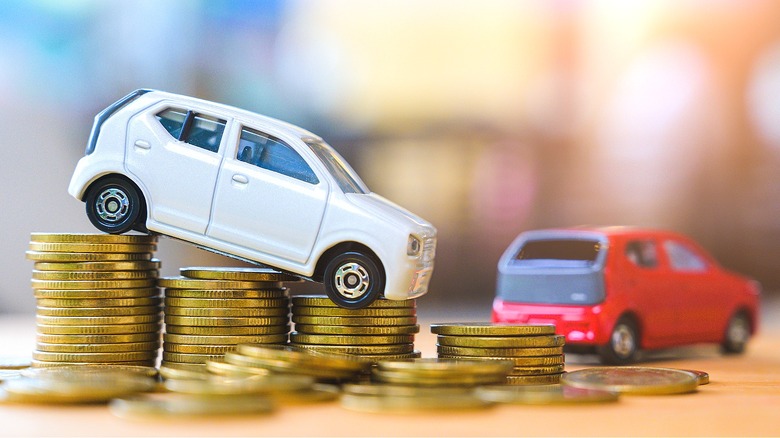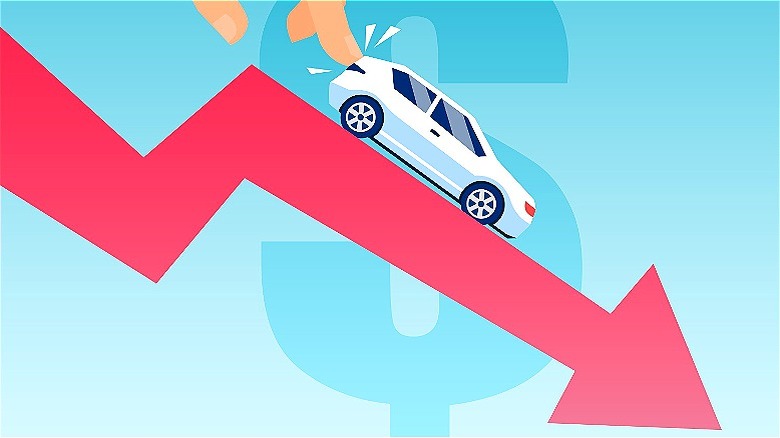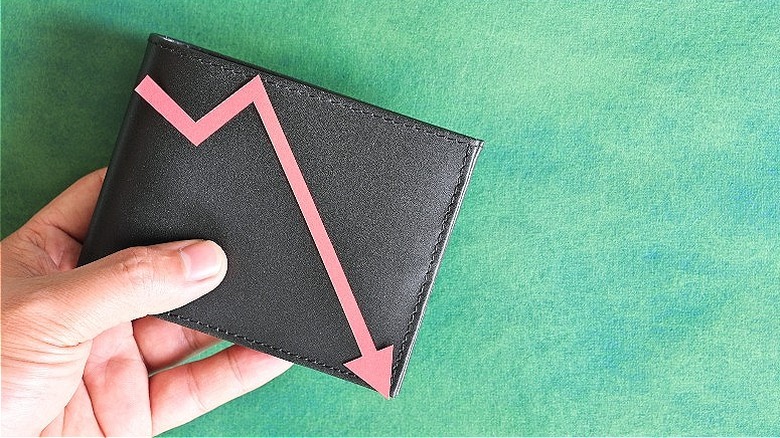Here's How Quickly A Car's Value Can Depreciate After You Buy It
Buying a new car can turn into a financial headache. Between higher car prices, increased interest rates on auto financing options, and the jump in car insurance rates (which is even worse in certain states), a new car can be a significant financial decision. The average price for a new car in October 2024 was $48,397, which, according to Cox Automotive, is around a $10,000 increase compared to 2020 prices. This increase in car value might have you wondering if your car will also keep its value for longer. Unfortunately, you will be disappointed to learn that your added expense does not help much with your car's long-term value.
Perhaps one of the worst parts of buying a new car is just how quickly the value of that car can decrease. This loss in value is something known as depreciation, and it can be an important consideration when car shopping. You've probably heard that a car's value starts diminishing the minute you drive it off of the dealership lot, and this is unfortunately true. In fact, a new car loses 10% of its value before you can even drive it home — and this depreciation only continues with every passing year.
This means you can expect to get back significantly less for your car than what you paid for it, should you decide to resell it in the future. Even worse, for those who require financing in order to purchase, it could leave you with a car that's worth less than what you might still owe on it.
What contributes to depreciation
While all cars lose value over time, there are certain factors that can further contribute to more (or less) depreciation. Everything from the mileage you put on your vehicle to your accident history to the exact model of car you bought can all factor into the eventual depreciation of the car's value. This is why it can be especially important to research the reliability and reputation of certain car brands, in addition to individual models, before making a purchase. Similarly, ensuring you keep up with the regular maintenance and care of your car can help to maintain value, since your car's condition is another factor in determining resale value.
However, even with all of these different factors, and even if you maintain your car in excellent condition, it will still depreciate every year no matter what. In fact, new cars depreciate by 15% every year during their first five years, meaning, at 5 years old, your vehicle will be worth around 60% of its initial value.
This depreciation can be even worse for luxury vehicles, such as BMWs, Maseratis, and Cadillacs, which can experience over 60% depreciation in their first five years. On the flip side, some cars can retain value. According to car-shopping guide Edmunds, some cars might experience as little as 6% depreciation in their first year. With all of that said, depreciation for a car generally slows down after the first five years, which is what can make buying a used car the more affordable option for many consumers. (On that note, here are 11 things people get wrong about buying a used car.)
How depreciation affects consumers
While depreciation can have financial consequences on a car's resale value, increasingly, it is also affecting consumers before they ever even fully own their car. According to a Q3 2024 survey from CarEdge, one in three people actually owe more money on their vehicle than their car is worth. To make matters worse, even though 31% of respondents were financially indebted for more than their vehicle's worth, when looking at only vehicles purchased since 2022, the rate jumped to 39%.
This is in large part due to the record-breaking increases in new car prices post-pandemic. These increases not only cost consumers more, but they also often require even longer-term loans. These longer-term loans, combined with the Federal Reserve's increased interest rates, have led to a debt crisis for many car owners. CarEdge's survey found that car owners with 84-month loan terms were $5,000 "underwater" (or owing more than their car's value) compared with owners who had 36-month loans that instead enjoyed over $12,000 in equity.
It's also worth mentioning that certain car brands and models are more likely to leave consumers financially underwater than others; for instance, luxury brands like BMW and Jeep. EV drivers, in particular, face higher rates of underwater ownership with 46% of surveyed EV owners reporting they are currently in negative equity. Among the absolute worst brands for loan-to-value ratios was Tesla, with significantly more negative equity ratios amongst consumers than other car brands. (Check out our breakdown of the 20/3/8 car-buying rule.)


